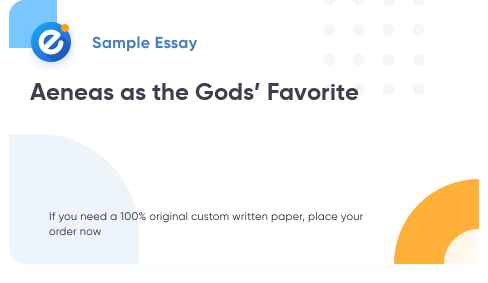
Since Aeneas is the main character of the epic poem written by Virgil, it is obvious that the plot will circle around him. It is typical for epos that a central figure of the narration is a positive character, so there should be indisputable virtues embodied in this figure. Aeneas is definitely described as a person to admire, both by appearance, e.g. “the beauty of flowing locks, with youth’s ruddy bloom, and on his eyes a joyous luster” (Virgil) and by moral qualities. Loyal Aeneas is a hero of Troy, his “fame is known to the heavens above” (Virgil), but gods predict even more glorious future for him. As it is seen from the dialogue between Jupiter and Venus, Aeneas was chosen to guarantee the future of Roman people and to personify them. Thus, his scrupulous piety and eagerness for justice became a symbol of Roman dignity. What is more, it is underlined that there is no violence in the hearts of the Trojans, and their intentions are peaceful.
Meanwhile, the actions of an epic character are normally opposed to the divine will, so they are to be soundly balanced to make the narration move fluent. Aeneas is the son of Venus, so her patronage will never leave him. The goddess, in turn, enlists her father Jupiter’s support to resist Juno’s machinations.
Calculate the cost of essay
The conflict of the poem begins with the intervention of Juno, the goddess of heaven. She has her own motives to prevent Aeneas from arrival, and Aeolus fervently helps her. However, in mythology, humans often become the battleground for gods. Neptune did not fail to stop the storm. He is not shown as a character personally interested in the destiny of Aeneas and his ships, but overall confrontation of gods is vividly shown by this example. The gods act as directors of a play, while human beings are only actors following the scenario.

